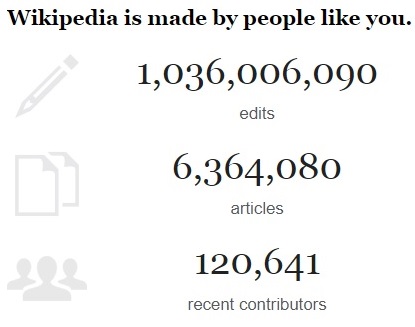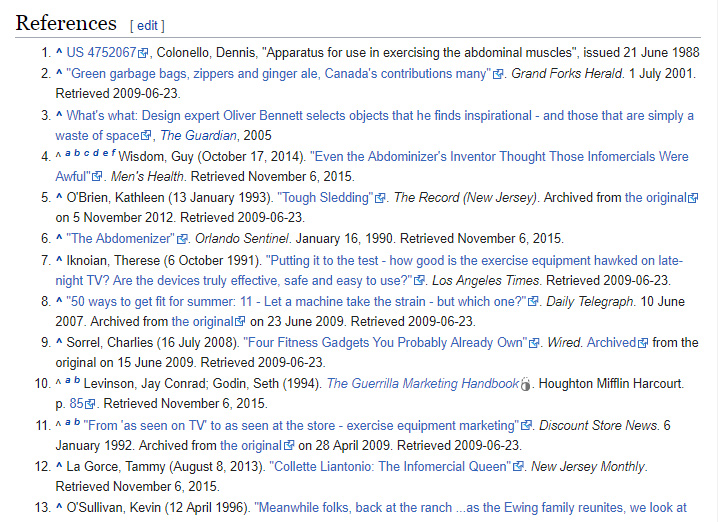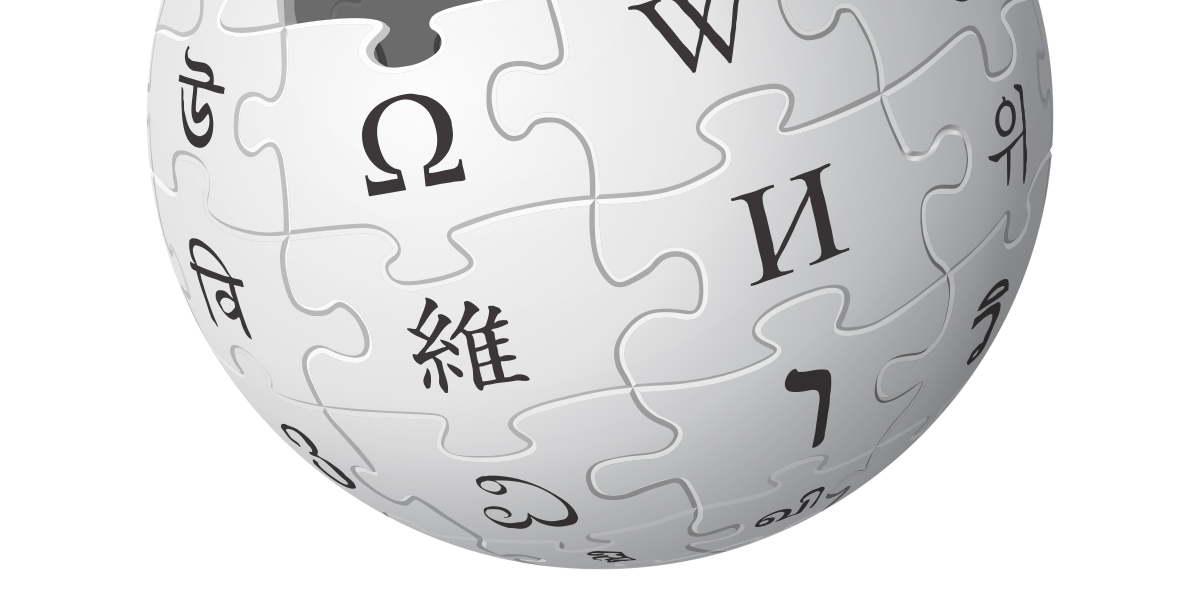When we talk about brand advertising, the first images that come to mind are usually eye-catching large format posters, vibrant social media campaigns, and the odd celebrity endorsement. Few people would envision the search engine results page of Google, and even fewer people would think of Wikipedia. But, if you sit back and mull it over, no matter what keyword you search on Google, a Wikipedia result typically stares back at you from the first page. In fact, the Wikipedia entry for Bill Gates ranks first on Google, even above Bill Gates’ own Twitter and blog. Honestly, you would be hard-pressed to come up with a notable topic that does not have a Wikipedia page.

Google results for ‘Bill Gates’.
Following that train of thought, businesses and individuals can borrow from Wikipedia’s authority when they have their own Wikipedia page. Because Wikipedia unequivocally states that it is a digital encyclopedia project and not a directory, Internet users know that listings cannot be bought and only the most prominent people, brands, and topics will warrant a page. When you have a presence on the platform—assuming that it is a favorable profile—you become viewed as more legitimate and credible, increasing trust in your brand and business. And since Wikipedia usually comes up top in search results, your brand visibility rises in the ranks as well. Being published on Wikipedia opens the doors to a massive audience and millions of potential gains in organic traffic.
Gaining the Respect of Wikipedia
So then, why are enterprising marketers not rushing to create Wikipedia pages? The reason is that Wikipedia is notoriously strict with the pages that are published on its platform. They even go as far as saying that having a Wikipedia article about yourself is nothing to be proud of. To prevent being inundated by commercially motivated article spam, Wikipedia has an in-depth conflict of interest policy that is based on their fundamental neutral point of view (NPOV) principles. In addition, they have rigorous requirements regarding article topics, writing tone, how sources are cited, and more. Their Manual of Style page has 20 categories, not to mention numerous specific subcategories that command individual pages. After reading the supporting documentation, even if one still has the gumption to consider submitting an article on Wikipedia, you have to first achieve a status whereby you are allowed to attempt article creation.
Building Up Your User Account
The first step to an illustrious career in Wikipedia publishing is to create a user account. Because Wikipedia is very sensitive to corporate influence, it is important to choose a username that comes across as distinctively personal. For example, a username like CatLover87392 would be viewed with much less skepticism than one like BestMediaPR. It is also recommended to use a personal email address instead of a company email address, if only to appear free of undesirable affiliations. As it says on the user registration page, ‘Wikipedia is made by people like you’, and you want to be just another average Joe.

Text on the Wikipedia user registration page.
Once you have created a Wikipedia user account, you need to prove that you can be a productive and valuable member of the community. Start to do this by making minor edits to existing articles. You can correct grammatical or typographical errors, add citations to verify statements, or even join a WikiProject to collaborate with other users on a niche interest. This initial stage helps you to understand the Wikipedia content management system, which can be a little finicky. Note that every change you make on the platform is recorded in your user history, so do not attempt to take shortcuts by making nonsensical edits; This could result in your account being blocked! If your account is more than four days old and you have made at least ten bona fide edits, you get upgraded to the level of an autoconfirmed user.
Autoconfirmed users are users that are considered constructive. They have slightly more rights than new users, with the main perk of the promotion being that they are allowed to create new articles. So now you can simply publish a page about yourself on Wikipedia, right? Regrettably not. Although afforded slightly more access, autoconfirmed users are still considered fairly low-level users. This means that after you have drafted your new article and submitted it for review, there remains a substantial possibility that it will not be accepted by the Wikipedia new page reviewers or administrators.
According to Wikipedia, there are 702 new page reviewers and 1087 administrators who have the mammoth task of evaluating each new article submission. As a result, it could take a few days or several weeks before you hear back about your submission. There is no way to guarantee that your self-written page will pass the initial evaluation of Wikipedia admins, especially if it is your first submission. Often, the submission will be declined, citing specific reasons and suggested areas of improvement. However, you can make edits and continue working on the article. To avoid an extended back-and-forth situation with admins, the best thing to do is to ensure that your page is near perfect before you send it off.
Crafting a Notable Page
Notability—or lack thereof—is the downfall of most aspiring Wikipedia articles. In Wikipedia’s words, “A topic is presumed to be suitable for a stand-alone article or list when it has received significant coverage in reliable sources that are independent of the subject.” While it may seem rather straightforward, there are many criteria in that short snippet that one needs to meet before claiming notability. Prospective Wikipedia pages must be supported by multiple independent sources, digital or otherwise. Therefore, advertisements, press releases, and autobiographies are all excluded. These independent sources must demonstrate editorial integrity and provide strong objective evidence of your notability—which means they need to talk about you with more than just a passing mention.
Have you been featured on television or had your career written about in a newspaper? Perhaps you are famous due to a unique ability or a ground-breaking invention. Before you dismiss the fuzzy constraints of notability, consider that Wikipedia pages exist for the Abdominizer, a piece of infomercial exercise equipment invented in the 80s, and French showman Tarrare, who was notable for his bizarre and insatiable appetite. Whatever your claim to fame may be, be sure to begin gathering sources to support it because Wikipedia will require all the information on your page to be verified. The quality and variety of your references matter as well. Established publications of editorial integrity such as Forbes will prove your notability much better than small-town newsletters. Other reputable sources could include documentaries, academic journals, and even works of fiction.

Citations for the Wikipedia page on the Abdominizer.
Once you have gathered the supporting reference citations, then you can proceed and start to draft your Wikipedia page. When writing your page, remember that the content has to be objective and factual. This might mean that you may have to include information about your major competitors and their products or certain embarrassing but significant events in your history. When (and if) your Wikipedia page goes live, you will not be able to control the information that other users add to the page anyway. Thus, it is better to preempt any awkwardness by writing about it yourself. You can also include images, as long as they are free of copyright.
After drafting your page, you will need to format it using Wiki markup or the Wikipedia Article Wizard to adhere to the platform’s style guide. This may be challenging for users who are unfamiliar with HTML, so do allocate a generous amount of time for this stage. Finally, when your article is ready, you can send it off for review and pray to the digital deities that it will be accepted by reviewers and administrators for publication.
If the process for getting listed on Wikipedia sounds terribly tedious and time-consuming, that is because it is. According to the platform, “if you or they are notable enough, someone else will create the article.” Of course, that is not to say that unlisted people or businesses are mere riffraff. Even search engine pioneer and Google advisor Danny Sullivan once had his notability questioned and his Wikipedia page removed. (It is reinstated now.) Because notability is inherently reviewer-subjective, there is no surefire way to guarantee a successful Wikipedia listing. Add to that the painstaking process of building a user profile and crafting content, and many people are ready to give up on their Wikipedia dreams.
However, there are some things you could do to exponentially increase your odds of being published on Wikipedia. Top-notch marketing companies with access to high-level user profiles with a long history of positive contributions can help to submit your draft page. They can also use their experience to help you establish notability, find citation sources, and write the story of you, all in line with Wikipedia style guide requirements. Whether you seek five minutes of fame or enhanced brand recognition, creating a Wikipedia page for yourself can bring unprecedented rewards, if you put in the hard work.
If you need help building notability and securing your own Wikipedia page, reach out to our team.






